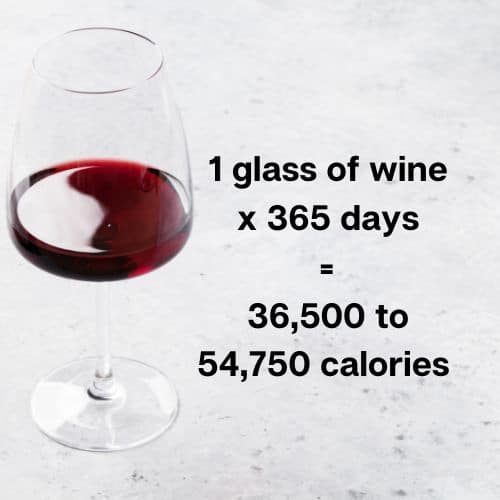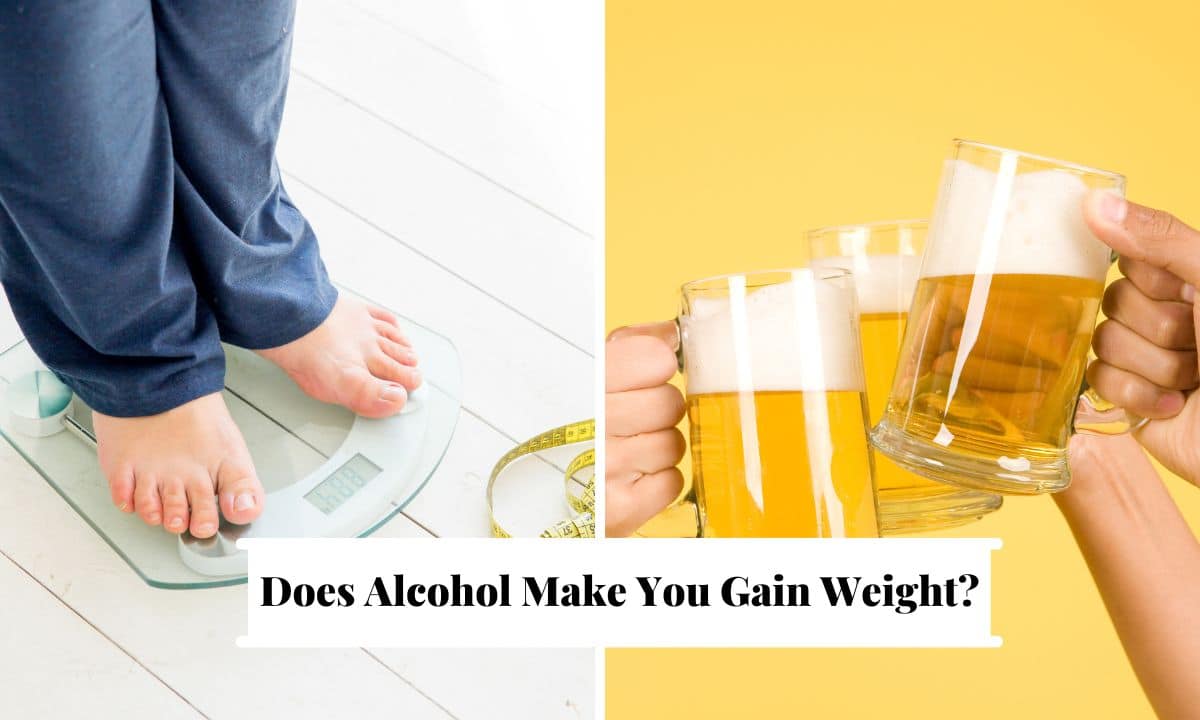Unveiling the Truth: Does Alcohol Make You Gain Weight?
Many people enjoy drinking a nice glass of wine or a cocktail as a way to relax and unwind after a long day. Alcohol is present in celebrations, meals with friends, and everywhere we go. It is part of our culture.
Table of Contents
ToggleBut is it bad for your waistline? Does alcohol make you gain weight?
How Alcohol Can Contribute to Weight Gain
There are a few ways in which alcohol can contribute to weight gain:
- It adds calories to your overall diet
- Drinking can trigger the appetite for greasy and salty food
- It can make you hungrier and less satisfied with the food you eat
- It slows your metabolism
The Calories in Alcohol
Alcohol contains 7 calories per gram, which is almost as many calories as fat (at 9 calories per gram) and more than protein and carbohydrates (4 calories per gram each).
It’s easy to add extra empty calories to your diet without realizing it.

One single glass of wine a day, for instance, would add an extra 100-150 calories to your daily calorie intake. Over the course of a year, this equates to 36,500 to 54,750 calories. Considering that roughly 3,000 calories can convert into a pound of excess weight, you potentially could gain 12 pounds in a year. All from just one glass of wine a day. Of course, many other factors play a role, but this is the basic math.
It’s not only the alcohol, though. This adult beverage is often mixed with other sugary drinks or juices that contribute to the calorie count.
The popular cocktail Moscow Mule has 210 calories and 20 grams of sugar. That means 76,650 calories in one year. And this is a very high-sugar, low-fat mix! Think about the number of calories in a high-fat beachy creamy drink.
Alcohol & Appetite
First of all, alcohol lowers your inhibitions and can trigger overeating. Have you ever eaten a nice juicy burger after a happy hour?
It’s common to crave unhealthy snacks or greasy food to offset the effects of the drinks.
The smell of food is so appetizing after drinking, and it’s hard to control. There’s a physiological reason for that. A small study suggests that it causes an increase in activity in the reward region of the brain, which is also what regulates eating behavior.
It’s possible that alcohol inhibits the hormones leptin, ghrelin, and GPL-1, responsible for regulating hunger. As a result, you end up eating more than usual and gaining weight. However, the studies are quite old and relatively small. Thus, we cannot say with certainty that this happens, but if you’ve ever had one too many, then you know that there’s something in it.
Can Alcohol Slow Metabolism?
When you drink, your body prioritizes breaking down and metabolizing alcohol over other nutrients like carbohydrates, proteins, and fats. This means that if you drink it while also consuming food, your body will store the calories from the food as fat because it’s not using them for energy.
Additionally, alcohol can also disrupt sleep patterns, shown to affect metabolism. Poor sleep quality frequently leads to increased hunger and cravings, which can lead to overeating and weight gain.
Excess alcohol intake can also result in what is known as alcoholic fatty liver. This is a serious condition that, amongst other things, affects how your body uses and stores carbohydrates and fats.
So, Does Alcohol Make You Gain Weight?
The answer is not clear. Some studies say yes, some say no, and some found no association. It will depend on how much you drink, how often, what you mix it with, and your overall diet. It will also depend on how alcohol affects your sleep and how it affects you as an individual.
Can You Avoid Gain Weight?
Yes. It is possible to drink and not gain weight. The key is moderation and choosing low-calorie drinks. Make sure to follow the guidelines of your diet plan.
The recommended daily limits for alcohol consumption are one drink for women and two for men per day.
Also, it’s important to follow your meal plan. For example:
- If you’re following an intermittent fasting plan, it’s best to drink within your eating window.
- If you’re following a keto diet, then your drinks should be zero sugar (to maintain your fat-to-protein ratio)
- If you are on a calorie-controlled diet, make sure you stay within your daily caloric intake.
It also depends on individual characteristics, like age, body weight, any health conditions, and how the body responds to alcohol.
Tips to Minimize Weight Gain from Alcohol
Reducing calorie intake from alcohol can be achieved through a variety of strategies, including:
- Choosing lower-calorie options: Choose lower-calorie beverages, such as light beer, wine, and hard seltzers, or spirits mixed with calorie-free mixers, like soda water, diet soda, or tonic water.
- Limiting portion sizes: Drinking smaller amounts of alcohol can help reduce calorie intake. For example, instead of ordering a large glass of wine, ask for a smaller size or split a bottle with a friend.
- Alternating with non-alcoholic drinks: Alternate alcoholic beverages with water, soda water, or other sugar-free non-alcoholic drinks to reduce overall calorie intake. This can also help you stay hydrated and avoid overconsumption of alcohol.
- Try mocktails. Thanks to the sober curious movement, mocktails have become popular. They can offer a great opportunity to reduce alcohol calorie intake and still enjoy the same flavors and textures of a classic cocktail.
- Being mindful of snacks: Drinking alcohol can increase appetite, leading to excessive consumption of high-calorie snacks. Being mindful of what you eat while drinking can help reduce your overall calorie intake.
By incorporating these strategies, it is possible to reduce the calorie intake from alcohol and maintain a healthy lifestyle.
My Expert Opinion
Alcohol is certainly a topic I discuss with all my weight loss patients. While it is possible to drink and not gain weight, it depends on how much and how often you drink. We discuss how alcohol affects them as individuals and how to incorporate alcohol into their diets.
I encourage them to find alternatives that they enjoy for the weekdays and drink in moderation while out with friends and family.
I emphasize the importance of setting boundaries to ensure they don’t drink too much and not to drink when they feel they shouldn’t. We discuss strategies to reduce risk, such as alternating between alcoholic drinks and nonalcoholic drinks or drinking a glass of water in between each alcoholic drink. I also remind them always to keep track of how much they’re drinking and that it’s okay to say no to drinks or to leave a gathering if they’re feeling uncomfortable.
We also talk about making better drink choices such as a light beer or a hard seltzer if that fits their preferences. Personally, I love to have a drink at the end of the day. But I learned that a very cold kombucha served in a beer glass does the trick for me.
My advice to you is to find out what works best for you, but make sure that if you choose to drink alcohol, you drink in moderation.

Dr. Su-Nui Escobar, a Registered Dietitian/Nutritionist in Miami, FL, is dedicated to empowering women in perimenopause and menopause to live healthier, more satisfying lives.
With a doctorate in clinical nutrition from the University of North Florida, she has expertise in menopause and weight loss, including the unique challenges faced by those on weight loss medications.
Su-Nui’s passion for her field is evident in her previous role as the Academy of Nutrition and Dietetics spokesperson.


